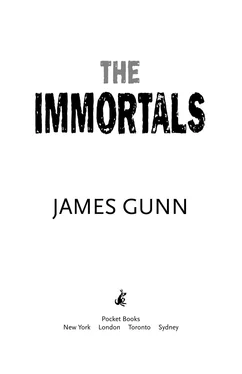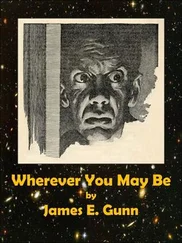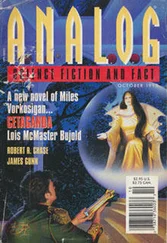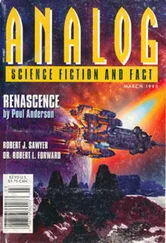“Is there any hope, Doctor?” she asked.
He lied. “No,” he said.
It was unethical; it gave him a queer, dizzy feeling, as if he had thrown mud at the hospital wall, but it was mixed with a strange feeling of elation. It was mercy. Of course she could see—if she had an operation costing several thousand dollars more than she would ever have. It was mercy to kill that hope quickly and finally.
Maybe it wasn’t ethical, but he’d just begun to realize there were times when a doctor must treat the patient and not the disease. In spite of what the professors said. Each patient was an individual with his own problems and his own treatment, and only part of both were medical.
“I don’t understand,” he said abruptly, “why the people let John Bone continue here with his corruption and his graft and his violence.”
“That is only one side, and a side few people see. To most of them he is the patron—or, in longer translation, the one who does things for us. What are you going to do about him?”
“Treat him,” Flowers said quietly. “There’s no point in being quixotic about this.”
“But, Medic—” she began.
“Ben,” he said. “Ben Flowers. I don’t want to talk about it. Someone might be listening.”
After that there was more silence than talking, but it was a warm sort of silence, warmer perhaps than speech, and her hand came creeping back into his.
When the policeman opened the door, it was night again. Flowers had only a glimpse of the hall before they were hustled in to see Bone in the dark-paneled room. The political boss had a warm red robe wrapped around his body, but he still looked chilled.
Bone watched Flowers’s eyes studying the room, and he said, “This used to be the city manager’s office. The mayor’s office is on the other side. I use that one for business, this one for pleasure, although there isn’t much business anymore—or pleasure, either, for that matter. So this is the girl. Blind. I should have known that. Well, Medic, what is it to be?”
Flowers shrugged. “I’ll treat you, of course.”
Bone rubbed his thin hands together with a dry, sandpaper sound. “Good, good.” Suddenly he stopped and smiled. “But how can I be sure that you will treat me properly? Maybe we should show the medic what my lack of treatment will mean to the girl?”
“That isn’t necessary,” Flowers said quickly. “I’m not a fool. You’re filming this. After I treat you, you’ll use it as blackmail to get future treatment. If you aren’t satisfied, you can turn it over to the county society. Besides,”—his voice deepened suddenly, surprisingly—“touch the girl, and I won’t lift a finger to save your life!”
The light in Bone’s eyes might have been admiration. “I like you, Medic,” he said. “Throw in with me. We’d make a pair.”
“No, thanks,” Flowers said scornfully.
“Think it over. Let me know if you change your mind,” Bone said. “But let’s get down to business.” His voice was eager.
“Have the ambulance motor started,” Flowers said.
Bone nodded at the sergeant. “Do it!”
They waited, the four of them, stiff with a watchful uncertainty. When the depths of the bag glowed dimly, Flowers began fastening the instruments to Bone’s emaciated body. Where’s Coke? he wondered.
He read the diagnosis, removed the instruments, and slowly stowed them away. Thoughtfully he explored the pockets of the bag.
“What is it?” Bone asked anxiously. “Tell me what’s wrong!”
Flowers’s face was sober. “It’s nothing to be concerned about,” he said, trying to hide his concern, but failing. “You need a tonic. You’re taking vitamins already, I’m sure. Double the dose.” He pulled out a bottle of pink pills. “Here’s some barbiturate-amphetamine pills to put you to sleep at night and wake you up in the morning. And here’s some extra ones.” He handed Bone a second bottle; in it the pills were round, flat, and green. “Take one of these three times a day.”
Bone frowned cautiously. “What’s in them?”
“Nothing that can hurt you.” Flowers shook out a couple into his hand, tossed them into his mouth, swallowed. “See?”
Bone nodded, satisfied. “Okay. Take the two of them back,” he said to the policeman.
“Wait a minute,” Flowers objected. “Aren’t you going to turn us loose?”
“Where’d you get that idea?” Bone chuckled. “I like having a medic around. Gives me a feeling of security.”
Flowers sighed, accepting it. “Well, I guess there’s nothing I can do.” He bent to pick up the bag and noticed the expression of disappointment that flickered across Leah’s face. His hand strayed past Bone’s neck. “Here,” Flowers said to the officer watching them suspiciously, “I suppose you’ll want to keep this.”
The policeman stepped forward to accept the bag and moved back with it in his hand. With the hand that held the gun, he reached down to scratch the back of his other hand.
Slowly Bone collapsed behind Flowers. It made a rustling sound. The policeman tried to lift the gun, but it was too heavy. It pulled him down. As he fell, he half turned.
“What’s happened?” Leah asked, startled. “What are those noises?”
Flowers caught up her hand and scooped up the black bag in one swift motion. “I knocked out Bone with supersonics and the cop with a hypodermic of neo-curare. Come on.”
As they went through the glass doors into the hall, he wondered again: Where’s Coke? There were probably stairs, but he couldn’t run down them leading a blind girl. He thumbed the elevator call button and waited in a frenzy of impatience. Leah held his hand firmly, confidently.
“Don’t worry. You’ll get us out.”
Cool certainty flooded over him. His shoulders straightened.
“What medicine did you give him?” she asked.
Flowers chuckled. “Sugar pills. Placebo. Imaginary medicine for an imaginary illness.”
When the elevator doors opened, the sergeant was behind them. He stared at them, surprised, and his hand dropped to his gun.
Flowers stepped forward confidently. “Bone said to let us loose.”
“That don’t sound like Bone,” the sergeant growled. He tugged his gun loose. “Let’s go check.”
Flowers shrugged, released Leah’s hand so that he could shift the bag into that one, and swung around so that the bag bumped into the sergeant’s leg. The sergeant brushed the spot casually, took two steps and fell, heavily.
As Flowers and Leah stepped out of the elevator into the basement hall, the lights went out. Coke, Flowers thought, and groaned.
“What’s the matter?” Leah asked, alarmed.
“The lights went out.”
“I could help if I knew what you were trying to do.”
“Find the ambulance. It should be somewhere in the basement.”
“They must have brought me in that way,” Leah said thoughtfully. “There was a door that clanged, some steps, another door, some more steps, and then a straight stretch to the elevator. Come on.”
Flowers held back for a moment and let her pull him into the darkness. “There are steps,” she said. They walked down carefully. Flowers found the handle of the door and held it open. A moment later they were going down more steps.
“This way,” Leah said confidently.
Within seconds they were beside the ambulance, climbing through the door, switching on the light. Flowers swung the responsive vehicle around with a feeling of elation approaching giddiness. Even the sight of the closed garage door didn’t bother him. He eased the ambulance as close as possible, swung out, touched the door gingerly, and tugged at the handle. It rose with well-oiled ease.
After that it was nothing. Flowers headed north for I-35, to avoid ambush and shake off pursuers. On the road he could outdistance anything. After a few minutes they hit Southwest Trafficway. Flowers turned the driving over to the chauffeur, and swung around to look at Leah. She was sitting on the cot.
Читать дальше












